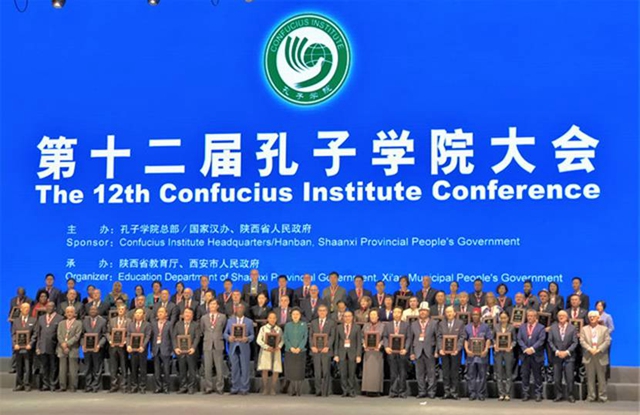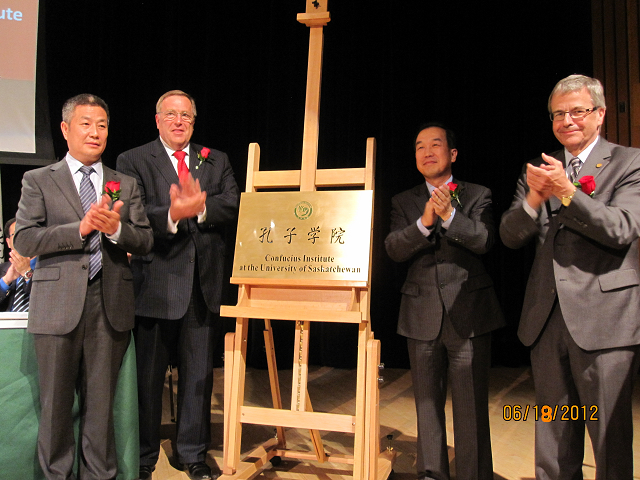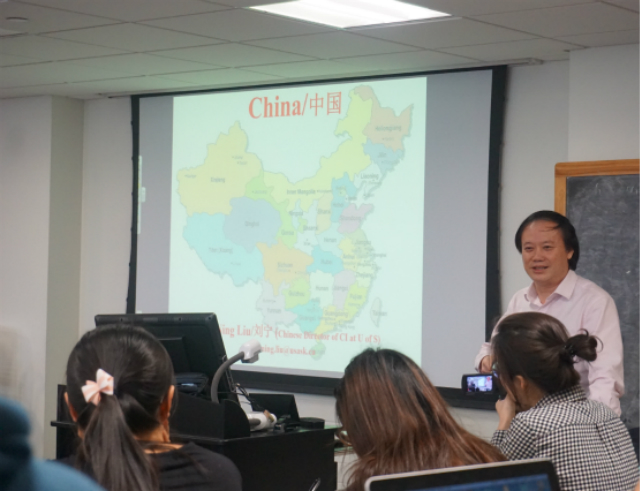Chinese Culture Is Blooming 8,500 Kilometers Away ¡ª¡ªDocumentary on the Construction of Beijing Institute of Technology-Confucius Institute at the University of Saskatchewan
¡¡¡¡Translator£ºNews Agency of BIT Pang Yu

Beijing Institute of Technology-Confucius Institute at the University of Saskatchewan was honored as ¡°Global Advanced Confucius Institute¡± at the 12th Global Confucius Institute Conference.
¡¡¡¡¡°Thanks to the Confucius Institute of the World for awarding this priceless and precious honor to us. As a bridge for traditional cultural exchanges between China and Canada, we will also shoulder the responsibility and work together to promote China-Canada traditional cultural exchanges with BIT.¡± This is an award-winning speech by Karen Chad, vice president of the University of Saskatchewan, Canada.
¡¡¡¡Karen Chad expressed his excitement. At the 12th Global Confucius Institute Conference in December 2017, Beijing Institute of Technology-Confucius Institute at the University of Saskatchewan was honored as the ¡°Advanced Confucius Institute in the World¡± for its academic attitude and excellence in teaching pursuits. Only 25 of the 525 Conafucius Institutes in the world enjoyed this award. The vice premier of the State Council and the president of the headquarters Council of the Confucius Institute, Liu Yandong, presented the award for the award-winning global advanced Confucius institutes.
¡¡¡¡Beijing Institute of Technology-Confucius Institute at the University of Saskatchewan was set up in 2011. It has achieved remarkable achievements after seven years of hard work, which not only witnessed the development of the ¡°flagship¡± partnership between the schools, but also became a shining star in the internationalization of education of BIT.
¡¡¡¡International cooperation in the development of talent
¡¡¡¡The Confucius Institute is an organization for the promotion of Chinese language and the dissemination of Chinese culture set up by the Chinese National Office for the Promotion of International Languages around the world. It aims to develop friendly relations between China and other countries in the world, enhance understanding of Chinese language and culture for people from all countries in the world and provide Chinese learners convenient and excellent learning conditions. Since the first Confucius Institute was founded in Korea in 2004, China has established 525 Confucius institutes in 146 countries and regions, with a registered student population of 2.3 million.
¡¡¡¡It is more than 8,500km away from Beijing to Saskatchewan. In the process of building a global cooperation network, two schools have worked together for more than ten years to build this ¡°flagship¡± friendship across the Pacific.

¡¡¡¡Beijing Institute of Technology-Confucius Institute at the University of Saskatchewan hosts the opening ceremony
¡¡¡¡The cooperation between the University of Saskatchewan and BIT started in 2002, and two schools formally signed a cooperation agreement in 2005. In the deepening cooperation, the vision of the two universities to build a Confucius college has gradually become clear, and the cooperative foundation which has been formed by the two schools has brought a direct impetus to the cooperation project. In 2011, the two universities reached the agreement on the establishment of the Confucius Institute and submitted the application to the Chinese National Office for the Promotion of International Languages. After approval, the Confucius Institute was established in June 2012. Zhao Changlu, Party Secretary of the school, also the Deputy Principal of internationalization personally led a team to Canada to attend the opening ceremony.
¡¡¡¡Setting up a Confucius Institute that meets the requirements of both China and Canada and meets the development needs of BIT and the University of Saskatchewan must address many practical problems and challenges, especially in addition to building a localized culture, disseminating Chinese culture and a high level of Chinese. Beyond the teaching platform, BIT also hopes that the Confucius Institute will become a platform for diversified exchanges to serve the internationalization of schools.
¡¡¡¡To achieve the localization of the Confucius Institute at the University of Saskatchewan, it is first necessary to establish and improve rules and regulations. Canadian regulations stipulate that the operations of the Confucius Institute must comply with the requirements of local policies and regulations. It is necessary to design practical courses that match the needs of the local community, and to implement teaching according to local policies and social conditions. For example, when organizing Tai Chi lessons, the local government cares about whether students are likely to be injured or whether the Confucius Institute has bought insurance for students. The management team sent by BIT has established a relatively complete management and teaching system, improved the teaching and curriculum system, and ensured the operation of the Confucius Institute has rules. In the process of communicating with the management institutions and academic organizations at all levels of the University of Saskatchewan, the Chinese team is familiar with the work practices, work processes, and work rhythms of the University of Saskatchewan. They cooperated effectively with the foreign team and arranged the daily management and teaching work reasonably.
¡¡¡¡Building better Confucius Institute with quality

¡¡¡¡tht students of Confucius Institute attend class
¡¡¡¡It is a must to put the quality of education in the first place to build an excellent Confucius Institute, to realize its original intention and to play its supporting role in the internationalization strategy of the school. Whether in China or in foreign countries, talent training is always the central task of first-class universities.
¡¡¡¡For years, the quality of teaching has always been placed first in the construction of Confucius Institute. ¡°Teachers are very important for the construction of Confucius college. We take teaching method as the primary requirement for the teachers of the Institute of Confucius.¡± Dr. Liu Ning, who is now the Chinese President of the Confucius Institute, not only thinks so, but also makes an example in his work. Liu Ning, who has been the director of the English Department of BIT, has 34 years of experience in teaching and management. He asked teachers not only to perform good lessons, but also to constantly summarize and analyze the teaching process to help students understand the theory and rules of language learning.
¡¡¡¡Different from the traditional university teaching, the Chinese teaching of Confucius college needs to expand the scope of teaching on the basis of teaching materials, guide students to carry out a large number of extracurricular reading, impart more cultural knowledge to students, cultivate interest in Chinese study, and break through cultural estrangement. Therefore, the teachers of Confucius institute pay great attention to the improvement of business level, not only to carry out extensive research, but also to grasp the frontier information in the field of Chinese teaching at home and abroad. It is in this atmosphere that the teachers of the Institute are actively engaged in education.
¡¡¡¡No matter what the cultural background, excellent teaching quality can win students¡¯ recognition. At the Confucius Institute at the University of Saskatchewan, the sophomore student Seth Isaac Teichroeb¡¯s story of learning Chinese is always impressive. In early 2017, when he was only 18 years old, he learned that the Confucius Institute had offered Chinese courses to the local public and he had come here to take classes. Confucius Institute Volunteer Teachers¡¯ excellent Chinese teaching level made him enthusiastic and rain-fighting. His family lives in a small town far away from Confucius college, and his parents drive him for 3 hours to take lessons every two weeks. After more than a year of unremitting efforts, Seth has successfully passed the HSK Level 4 of the International Chinese Language Proficiency Test. HSK is the most authoritative foreign language evaluation standard for foreigners. HSK Level 4 means he can use Chinese to discuss topics in a wide range of fields and can communicate with Chinese native speakers fluently.
¡¡¡¡The recognition and achievement of students is the best affirmation of the level of Confucius Institutes. ¡°With students who love Chinese and Chinese culture so much, we feel what we did is worth of time.¡± Liu said.
¡¡¡¡The excellent teaching quality of the Confucius Institute at the University of Saskatchewan benefited from the establishment of the master¡¯s degree program of ¡°Chinese International Education¡± of BIT. In 2014, according to the requirements of the Chinese National Office for the Promotion of International Languages, in order to support the sustainable development, BIT set up a master degree point for ¡°Chinese International Education¡±, and began to enroll in 2015. There are now 8 graduates and 37 students, including 12 international students. The volunteer teachers from BIT are with excellent professional qualities and international communication skills. They will use Chinese language teaching and Chinese culture as the medium to continuously attract Chinese learners to the teaching and cultural activities of the Confucius Institute. In 2017, the Confucius Institute opened 85 classes of Chinese courses at all levels, with a total of 1956 students, up 12.5% from 2016, 60 of all kinds of cultural activities, 41260 people, up 43.8% from 2016. The degree points organized the ¡°China Canada¡± and ¡°China Africa¡± higher education, and organized the native Chinese textbooks, such as The History and Culture of the First Nations in the Pacific Coast of Canada .
¡¡¡¡Carrying forward culture promotion through communication
¡¡¡¡The mission of the Confucius Institute is reflected in the teaching and promotion of Chinese language and the dissemination of Chinese culture, as well as the responsibility of building a bridge for cultural exchanges. The Confucius Institute, which was built by BIT and the University of Saskatchewan, has always practised the concept of cultural exchange. It not only establishes friendly cooperative relations with the colleges and administrative agencies, but also pays attention to the friendly cooperation with the local communities, especially the local primary and middle schools, the Chinese community and the various groups, and through the creation of a series of Chinese cultural activities to make the exchanges of Chinese and Western cultures better.

¡¡¡¡Children students listened to stories in the 2018 Easter China Camp Library
¡¡¡¡Chinese teachers and local volunteers of Confucius Institute combine Chinese language and culture with interest and characteristics, and promote ¡°learning with pleasure¡±. Since 2014, the Confucius Institute has held an Easter China Cultural Camp every year, attracting more than 150 children. Handmade, paper-cut, calligraphy, Chinese painting, Chinese songs and Chinese geography and other lively and vivid cultural courses, help small students to deepen the understanding of Chinese and Chinese culture. In addition, the ¡°New Year¡¯s night¡± party and a series of unscheduled Chinese food cultural experiences have been welcomed by the local society, which not only expands the influence of the Confucius college, but also allows more Canadians to understand and love Chinese culture.
¡¡¡¡In addition to actively organizing Chinese cultural exchanges in Canada, Confucius Institute also plays an active role in cultural bridgehead and becomes the development platform for the ¡°flagship¡± partnership between BIT and the University of Saskatchewan. On the annual Council of the Confucius Institute in 2014, leaders of two schools reached consensus to promote cross disciplinary integration of Arts and Sciences and expand student exchanges. Since 2015, the two schools have jointly established the scientific research seed fund to promote cross research on life science, water treatment, data security and urban sustainable development, and organize a number of visits between teachers and students to provide effective support for the international strategy of BIT. In 2016, Confucius college sought the financial support from the University of Saskatchewan, and successfully organized the Chinese visiting and learning group of the aboriginal students and the visiting group of the senior executives. Through these high-level exchanges, many teachers and students who participated in the interview and visit were deeply touched. After returning to Canada, they became the ¡°fans¡± of China, which led to more Canadian attention, Chinese culture and tradition, and the initiative to disseminate Chinese culture.
¡¡¡¡In August 2017, Confucius Institute held an international symposium entitled ¡°Internationalization, Education and Social Development¡± at the University of Saskatchewan. It explored the academic issues of internationalization of higher education, localization of Confucius college, cross integration of liberal arts and other academic issues. More than one hundred experts and scholars from China and Canada participated in the seminar. Many representatives attend the seminar at the invitation including Long Teng, the Principal Assistant of BIT at that time. The seminar has achieved great success. The two schools decided to hold the second seminar in Beijing in 2018 and reached a consensus that the seminar should become the ¡°flagship¡± to promote partnership, strengthen educational cooperation, build the Confucius Institute for the future, and share common progress and win-win platform.
¡¡¡¡Looking forward to the future, in the course of the great rejuvenation of the Chinese nation, the dissemination of Chinese culture is an indispensable part of national exchange and cooperation. Confucius Institute is a practical measure for BIT to serve the country¡¯s major strategic needs. We believe that, in the long run, the Confucius college, which is built by BIT and international partner, will write more beautiful and wonderful chapters for the construction of a world-class institute with Chinese characteristics.

